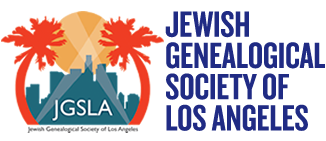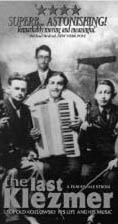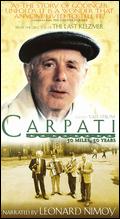January 2007
JGSLA DATES AND UPDATESJEWISH GENEALOGICAL SOCIETY of LOS ANGELES January 2007 |
|
· Program for Sunday, January 28, 2007· Two Film Screenings, Brunch and Lecture on numerous recordings and soundtracks. He was the first photographer since Roman Vishniac to publish photographs of Jews in the Eastern Bloc countries. For additional information, go to [www.jgsla.org]. Press the link in the program box on the Homepage. LOCATION: Bernard Milken Jewish Community Campus, 22622 Vanowen St., West Hills, CA. Exit the westbound Ventura Freeway at Shoup, turn right onto Shoup, and continue for 1.5 miles and turn left on Vanowen. From the west, exit the eastbound Ventura Fwy. at Fallbrook, turn left on Fallbrook, then right on Vanowen
|
|
| Thanks! Sonia Hoffman [president@jgsla.org] Two members are leaving the board, Marion Diamond and Gerry Winerman. Marion has served as Secretary and has always been there for a multitude of tasks. We will miss her very much. Gerry served on the JGSLA board for many years and in many positions, including President and Program Chair. She returned in 2006 to serve as Past President. Gerry will continue to participate in helping with mailing Roots-Key and assisting individuals with their research at the LDS FHC. Thanks to all the other memb ers who have served the society in 2006, both as board members and in other roles, as volunteers for the cemetery project, as speakers at our meetings, as contributors to our publications, and as speakers for other groups about genealogy and our society. It takes a great many people to make JGSLA work. We do a lot with a very limited budget because of the hundreds of hours that our volunteers contribute. We are always looking for people to help with our activities, so please consider offering to play a role of some kind in 2007. Drop me a line and we will be sure to find a suitable role for you! International Tracing Service’s Archive of Nazi-era Documents (aka The “Arolsen” Records) Hal Bookbinder [hal@jgsla.org] As you have likely heard, the Arolsen Records, will finally be made available for public research. This is a vast archive of over 16 miles of shelf space containing an immense resource of materials on victims of the Nazis. While limited access has been allowed for years, for most, the information was simply not accessible. Many have petitioned the powers that control access to the records to open them. As president of the IAJGS, I corresponded with the German Interior Minister on this a few years ago, obtaining his assurance that he would press for making the records available. If you would like to learn more about this archive and what it holds, you might check various articles, including, [web.israelinsider.com/Articles/AntiSemi/9879.htm] and [www.washingtonpost.com/wp-dyn/content/article/2006/11/ 18/AR2006111800637_5.html] Baltimore by way of New York? Some New York passenger lists contain other destinations. If the ship made stops at several ports, the ship’s log will register all passengers departing from that particular port, and will appear on the same roll of film. For example: NY Passenger arrival film #1027805 Roll 641 (NARA) for May 17, 1895. NY arrivals on the SS Wittekind have the Baltimore lists immediately following the NY lists. The same thing occurs with the SS Stuttgart arriving on May 22, 1895. Departing NY passengers are listed separately from departing Baltimore passengers. Member News Our best to Albert and Barbara Algaze on the birth of a grandson, Alexander Carroll Croson. Alexander was born on December 14th in Dallas, Texas. Share Your Hints and News Please let us know of major family events, brief research stories, exciting research successes and research hints so that they can be shared in Dates & Updates. Send your input to Hal Bookbinder, D&U Editor [hal@jgsla.org]. |
Latest from Stephen Morse Joy Rich [joyrichny@earthlink.net] Steve has created a new Ellis Island One-Step search form – the gold form. It is capable of searching through the entire twentyfive million passengers in the Ellis Island Database, and it can search on every transcribed field. His gold form makes his blue and gray forms obsolete. The blue form could search on every field but only for the one million Jewish passengers. The gray form could search for all passengers but only on four fields (name, age, year of arrival, and town). The gold form has these new features:
Although the gold form also makes his white form obsolete, Steve is going to keep both the white form and the gold form available. Because they use different search engines (the white uses the Ellisisland.org search engine, and the gold uses Steve’s One-Step search engine), they may provide slightly different results. But the gold form should be the form of choice. The white form was superior to the form on the ellisisland.org website, and the gold form is far superior to the white form. The gold form is the third item listed under “Ellis Island Search Forms and Ship Arrivals (1892-1924)” on Steve’s website at [www.stevemorse.org]. Continue the Roots-Key Tradition JGSLA is looking for one creative, organized, inspirational, dedicated, eager, and genealogically driven person to be the new editor of our award-winning journal, Roots-Key. Our editor is retiring and there is a spot for a creative editor or writer to shape the journal for the future. Roots-Key is unique among publications from other genealogical societies because of the quality and originality of its articles. The journal appears four times a year, and it is the responsibility of the editor to set the tone for the content. The editor works closely with a publications committee, copy editors, proof- readers, and a panel of others with diverse skills who provide expert assistance under the direction of the editor. The job of editor could be divided into several jobs, depending on the talents we can assemble. The most challenging task for the editor is to identify potential subjects of interest to our members and to find authors who can write about these topics. Recruitment and nurturing of authors, and keeping to publication schedules, are important tasks for the editor. He or she could share the job with an editorial team, and the technical aspects of preparing issues for publication could also be shared with another person with those skills. If you have an interest in continuing the great tradition and have some ideas about what you would like to see in the journal, please contact Sandy Malek by email at [sandy@jgsla.org] to discuss your interest and learn more about this opportunity. |
| Yad Vashem Names Recovery Project Ann Harris [aharr14@pacbell.net].The JGSLA will be part of the Worldwide Names Recovery Project. Register names of Holocaust victims at Yad Vashem today! In November 2004, the incredible Yad Vashem database documenting the lives of 3 million of the Jewish Holocaust victims went online. Each Page of Testimony represents one life that links the person to the living remnant of the family: survivors, family members and friends. As many names are still missing, Yad Vashem is calling on those who possess information on victims who have not yet been recorded to urgently submit the missing names. While making this appeal to individuals, Yad Vashem is also urging Jewish organizations to initiate local grass roots name collections campaigns and to encourage members to join such campaigns. The JGSLA will be an official participant in this important campaign and Ann Harris, board member, has agreed to coordinate our efforts. You will be hearing about our plans in the coming weeks and months, starting with the announcement of the campaign and the availability of forms, at upcoming meetings and on our website. Search the site today, and submit unrecorded names and pictures. Help ensure no Holocaust victim is forgotten. Names may be registered in two ways:
You can get a list of all the Pages of Testimony you have already submitted by locating the Page of Testimony for any one of the victims, and then clicking on the link “Pages of Testimony by submitter with the same name.” This will display the names of all of your submissions. For more information or help in filling out forms and making submissions, you can contact Ann Harris (323) 933-3194, [aharr14@pacbell.net]. Belarus SIG under new management For the past year, the Belarus SIG has been in leadership transition. A new team is now in place with Sharon Fingold and David Feldman as coordinators. They write, “If you are a research project leader and want our attention sooner rather than later, if you have ideas for new research projects, if you have suggestions for the web site, or specific questions about SIG management, please send your email messages to: [belarus.sig@gmail.com].” Salt Lake City Conference, July 15 – 20, 2006 Join your friends at the Jewish Genealogical Event of the year! Registration is now open at [www.slc2007.org]. The conference will include more than a hundred lectures, a film festival, an amazing photo exhibit, lots of SIG activities, extended hours at the Family History Library and opportunities to tour breathtaking sights and scenery. |
But, can you believe it? Hal Bookbinder [hal@jgsla.org] The Internet is a great place for spreading news, rumors, halftruths, and just plain lies. Obviously, we need to be cautious about information we read on it. And, just because we have seen it a dozen times doesn’t make a falsehood into the truth. There is a great website you can use to check on whether the latest item you have read is truth or fiction, [www.truthorficition.com]. Did your ancestors pass through Antwerp? Bobby Furst [bobby@jgsla.org] From 1873 to 1935 the Red Star Line shipping company transported nearly three million people from Antwerp, Belgium to the USA and Canada. There’s considerable data concerning the ships and the company and pictures with a link to the Belgium- Roots Project, which contains an alphabetical list of individuals who emigrated from Belgium and are being researched by others . See: [belgium.rootsweb.com/_fam/emigrants] and [www.redstarline.eu]. JRI-Poland Project Indexing Galician Records JRI-Poland recently announced a new project to index the newlyreleased collection of microfilms filmed by the LDS Family History Library, of Jewish records filmed at the Central State Historical Archives of Ukraine in Lviv, covering some 60 Galician towns, most of which are now located in Ukraine, and span years from 1789 to 1942. Galician researchers with an interest in any of the towns listed below or those interested in coordinating the indexing of the records for their town should contact either Mark Halpern at [willie46@comcast.net] or Hadassah Lipsius at [kesher@lipsiusgroup.com]. Belyy Kamen, Berezhany, Bolekhov, Borshchev, Brody, Budanov, Bukachevtsy, Chervonograd (Krystynopol), Chortkov, Drogobych, Glinyany, Gorodenka, Gorodok, Grimaylov, Gusyatin, Ivano Frankovsk (Stanislawow), Kamenka Bugskaya, Kolomyya, Kosov, Kozielniki, Kozlov, Kudrintsy, Lubycza Krolewska (Poland), Lviv, Melnitsa, Mikulintsy, Mostiska, Nadvornaya, Narayev, Navariya, Nesterov (Zhovkha), Novyy Vitkov, Olesko, Okopy, Ozernyany (Ozerna), Ozeryany, Podgaytsy, Podvolochisk, Probezhnaya, Radekhov, Rozdol, Rudki, Rzeszow (Poland)?, Sambor, Skalat, Sokal, Staryy Sambor, Stryy, Strusov, Sukhostav, Tartakov, Ternopol, Tuchin? (not Galicia), Turka, Wielkie Oczy (Poland), Velikye Mosty, Verkhneye Krivche, Vinniki, Yagelnitsa, Zbarazh, Zborov, Zimna Woda, Znesenye, Zolochev Find a Hard-to-Find Book Both the Yahoo and Google search engines tie into the “Open Worldcat Project” which will help locate libraries that hold a hard-to-find book you’ve been searching for. Simply enter the name of the book in the search field of Yahoo or Google, followed by “Find a Library”. This will respond with a listing of libraries holding the item. [Ed: I tried this for ‘Jewish Princedom “Find a Library”’ and it listed several hundred libraries holding “A Jewish princedom in feudal France, 768-900” by Arthur J Zuckerman – a fascinating read. Interestingly, the listing began with libraries in the Los Angeles area. I had not indicated where I was located. But somehow, it knew. |


